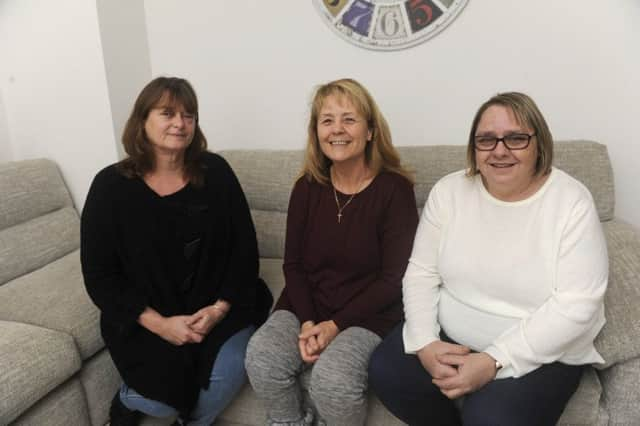REAL LIFE: Meet the grandparents who are legal guardians for their own grandchildren


Behind their weary smiles are years of personal trauma which have seen each of them endure tremendous heartache.
Tess, 65, and her friends Angela Holloway and Nicky Wood are the founders of the support group Grumbling Grandparents.
Advertisement
Hide AdAdvertisement
Hide AdIt’s not for grandparents who babysit their little ones every now and then.
It’s for those people, often pensioners, who are the legal guardians of their grandchildren because their own children are not able to parent them.
There are myriad reasons why people in their fifties, sixties and even seventies are taking on responsibilty for their grandchildren.
They range from substance abuse, imprisonment and mental illness, to parents who simply leave their children.
Advertisement
Hide AdAdvertisement
Hide AdTess estimates there are scores of grandparents like her in south-east Hampshire coping with the exhaustion of looking after babies, demanding schoolchildren and hormonal teenagers, long after they thought they’d seen the back of all those sleepless nights.
What all the members of Grumbling Grandparents have in common is a fierce love and unwavering determination to never give up on grandchildren who have already experienced much trauma in their young lives.
Tess, from Hayling Island, tells her story.
‘My grandson George, who is now 15, was born 11 weeks early, addicted to heroin.
‘He had to be weaned off the drug.
‘After a few months we found out that he was under a child protection order for emotional and physical neglect.
Advertisement
Hide AdAdvertisement
Hide Ad‘It led to social services telling my husband and I that either we took him and went to court for legal guardianship or he would be taken and put up for adoption.
‘What choice would you make?
‘Over the past 15 years, we have had so many awful problems that we couldn’t cope with together that we separated for five years.
‘Our beautiful grandson was diagnosed with autism and ADHD and we struggled for a long time with understanding this and trying to get the right help and schooling.
‘We struggle financially. I had to give up my job as a nurse – which I loved – to care for our boy.
‘Other than the financial loss, I became very isolated.
Advertisement
Hide AdAdvertisement
Hide Ad‘Parents are usually much younger and able to do more active things with their children.
‘We struggled with having to choose between our child and our grandchild.
‘We couldn’t cope with both, emotionally or financially. Then there are the struggles with visiting rights that the courts deemed necessary.
‘It can cause huge damage to children when the birth parents don’t turn up – or when they do they’re stoned or drunk or demanding that we give their child back as we had “stolen him” from them.
Advertisement
Hide AdAdvertisement
Hide Ad‘Then there are birthdays and Christmases when they forget to send them a card or even call them.
‘They must feel such rejection.’
Tess says her situation is not unique and she believes there could be hundreds of grandparents in her situation in the area.
They have all had to navigate the often bewildering and complex legal system which at times seems weighted in favour of the parent, rather than the child, to be granted guardianship.
She adds: ‘My story is not unique. And not all grandchildren being raised by grandparents will have special needs – though many seem to have problems more serious than children living with birth parents.
Advertisement
Hide AdAdvertisement
Hide Ad‘This is possibly due to reasons such as a parent dying, alcoholism or substance abuse.
‘And it seems that rejection is a very big issue too.
‘Whatever the reason we have these children, we are here to love and protect them and raise them to be the best they can be.
‘Our support group is for anyone who would like to come and not feel they are alone, as I know my friends and I once did.
‘Our group is small and sometimes only two or three of us are there.
Advertisement
Hide AdAdvertisement
Hide Ad‘But we warmly welcome any grandparents raising their grandchildren who would like to come – for whatever reason.
‘We are friendly and informal and have plenty of coffee, tea and biscuits ’
The meetings are held monthly at Hayling Island Community Centre from 9am until 11am.
The next meeting is February 12, then March 12, April 9, May 14 and June 11.
Advertisement
Hide AdAdvertisement
Hide AdThere are plans for a private Facebook group for members. Call (023) 9200 6262 for more information.
---
According to national charity GrandparentsPlus, more than 180,000 children in the UK are raised by grandparents.
The charity’s State of the Nation Report 2017 reveals:
- 52 per cent of the children in kinship care (in the care of relatives) have experienced abuse or neglect
n The average household income for kinship families is just £17,316, compared to the national average of £27,200
Advertisement
Hide AdAdvertisement
Hide Ad- 47 per cent of carers say they are not getting the financial support they need, including 28 per cent who feel very poorly supported
- 65 per cent of carers say they need more emotional support
Grandparents Plus was founded in 2002 by the late Jean Stogdon, a retired social worker, and the late social entrepreneur Michael Young, who also founded the Open University.
It is the only national charity in England and Wales dedicated to grandparents and their role in the care and development of their grandchildren.
For more information go to grandparentsplus.org.uk.
For a listening ear locally, contact Tess Balchin at Grumbling Grandparents.